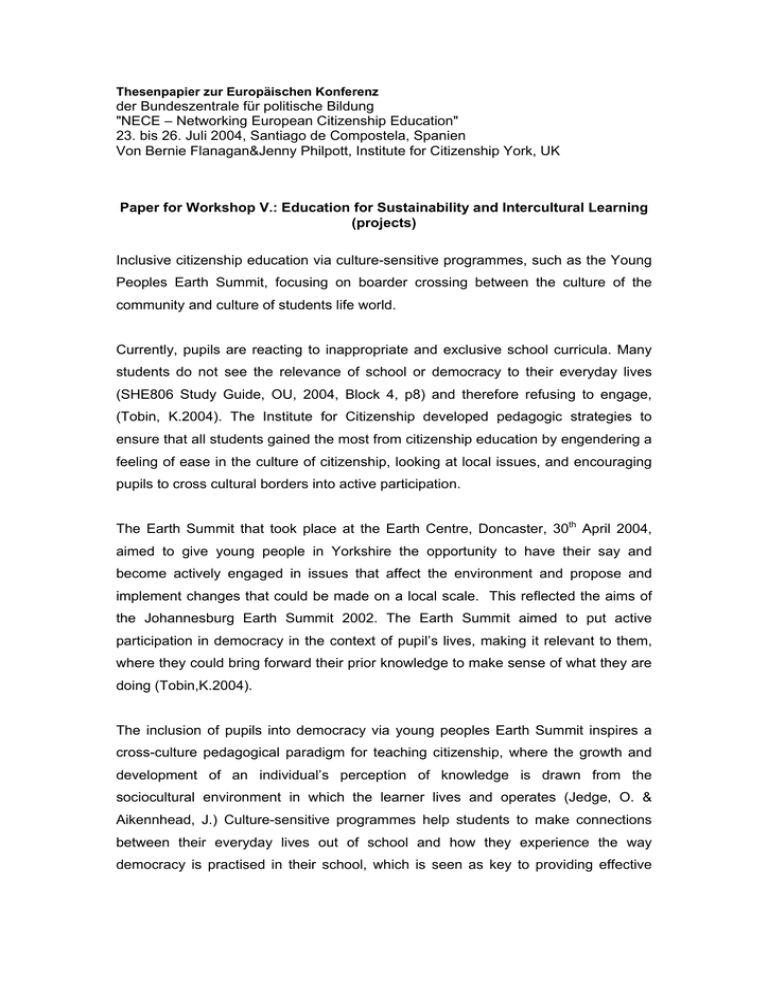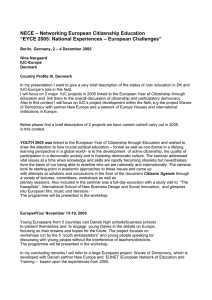Document 12630360
advertisement

Thesenpapier zur Europäischen Konferenz der Bundeszentrale für politische Bildung "NECE – Networking European Citizenship Education" 23. bis 26. Juli 2004, Santiago de Compostela, Spanien Von Bernie Flanagan&Jenny Philpott, Institute for Citizenship York, UK Paper for Workshop V.: Education for Sustainability and Intercultural Learning (projects) Inclusive citizenship education via culture-sensitive programmes, such as the Young Peoples Earth Summit, focusing on boarder crossing between the culture of the community and culture of students life world. Currently, pupils are reacting to inappropriate and exclusive school curricula. Many students do not see the relevance of school or democracy to their everyday lives (SHE806 Study Guide, OU, 2004, Block 4, p8) and therefore refusing to engage, (Tobin, K.2004). The Institute for Citizenship developed pedagogic strategies to ensure that all students gained the most from citizenship education by engendering a feeling of ease in the culture of citizenship, looking at local issues, and encouraging pupils to cross cultural borders into active participation. The Earth Summit that took place at the Earth Centre, Doncaster, 30th April 2004, aimed to give young people in Yorkshire the opportunity to have their say and become actively engaged in issues that affect the environment and propose and implement changes that could be made on a local scale. This reflected the aims of the Johannesburg Earth Summit 2002. The Earth Summit aimed to put active participation in democracy in the context of pupil’s lives, making it relevant to them, where they could bring forward their prior knowledge to make sense of what they are doing (Tobin,K.2004). The inclusion of pupils into democracy via young peoples Earth Summit inspires a cross-culture pedagogical paradigm for teaching citizenship, where the growth and development of an individual’s perception of knowledge is drawn from the sociocultural environment in which the learner lives and operates (Jedge, O. & Aikennhead, J.) Culture-sensitive programmes help students to make connections between their everyday lives out of school and how they experience the way democracy is practised in their school, which is seen as key to providing effective citizenship education. As this project was politicised and issue based, it was more likely to foster the notion that citizenship is a culturally embedded activity. The design of the Earth summit, guaranteed that students socially constructed meaning for themselves, as issues discussed directly influenced teaching and leaning. Schools from across Yorkshire researched a topic for six months, generating information from the indigenous community, linking it to the practices of science and democracy and coming up with culturally sensitive strategies to deal with the problem. They then convened at the Earth Centre to present their ‘mission statement’. Each group had access to outside ‘experts’ who assisted pupils in making transitions easier between cultural boundaries. In addition, using local issues ensured that the degree of cultural difference between their life-word and science classroom was minimal. Throughout the entire Earth Summit experience, young people were active participants in problem solving and critical thinking, constructing their own knowledge by testing ideas and approaches based on their prior knowledge and experiences, applying those to a new situation and integrating the new knowledge gained with preexisting intellectual constructs. Students achieved this by researching a topic for six months and collaborating with outside organisations, presenting their mission statements, followed by peer mentoring question and debate session in order to help each other to refine mission statements This collaborative element of the resource draws on social constructivist theories, as it introduces the means of developing an important transferable skill of peer negotiation into a teaching sequence. Furthermore, Tobin (2004) suggests democracy is a form of discourse that can therefore be regarded as a form of argument where ideas are formulated then argued out in a social forum, which is precisely what this activity achieved. Students then took part in a ‘question time’ type event. Following the conference schools then implemented their action plans in their local community References Hodson, D. (2003). Teaching and Learning Science; Towards a Personalized Approach. . Maidenhead, Open University Press Olugbemiro, J. Jedge,J. & Aikenhead,G. (2004) Transcending cultural borders: implications for science teaching. In Scanlon, E, et al, ‘Reconsidering Science Learning’, London, Routledge, pp. 153-176 The Open University, (2004) SEH806, Contemporary Issues in Scientific Learning, Block 4, Milton Keynes, The Open University Tobin, K. (2004) Cultural perspectives on the teaching and learning of science. In Scanlon, E, et al, ‘Reconsidering Science Learning’, London, Routledge, pp. 176-195





